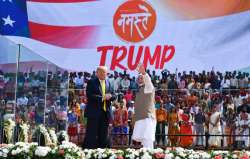In NUMBERS: Is a trade deal with the US in India’s national interest?
In the list of top 10 companies getting H1-B visas in 2016, 37,370 visas were given to Indian companies which is 51 per cent of the total H1-B visas given to top ten companies that year. But in 2019, of the total H1-B visas granted to top 10 companies, only 9,808 visas, i.e. 24 per cent were given to Indian companies

As US President Donald Trump delivered his maiden address in India, in front of a massive crowd at Ahmedabad’s Motera Stadium, a trade deal with India played big on the mind of the US President.
“Prime Minister Modi and I will be making some very big trade deal to boost our countries’ economies. I am sure that we can reach a good trade, but PM Modi is a tough negotiator,” the US President said during his speech in Ahmedabad.
However, opposition within India to any trade deal whatsoever has been rising in the lead-up to the President’s visit, with opposition Congress’ concerns being seconded by a farmers’ organisations, RSS-affiliated think tank Swadeshi Jagran Manch (SJM) and other industry bodies.
"India has been reduced to a lowly buyer state from a strategic Partner. India has no role in Afghan Peace Process," former Union Minister Manish Tewari commented on Sunday, adding that only big defence manufacturers’ such as Boeing's, Lockheed Martin's and General Atomics.
Swadeshi Jagran Manch has also cautioned the Centre against reducing tariffs on dairy products at the insistence of the US President, alleging that such a decision could spell doom for Indian poultry farmers. Significantly, the SJM was at the forefront of a campaign last year against the Regional Comprehensive Economic Partnership (RCEP), which had been endorsed by Centre but didn't see the light of the day due to concerns of domestic farmers and business.
Peak body Poultry Federation of India highlighted with concern that reaching any understanding with the US could affect a $100 million domestic ecosystem which supports four crore jobs.
From the ruling party quarters, Bharatiya Janata Party MP Subramanian Swamy has also taken the pledge of an impeding trade deal with a hint of salt. In significant remarks delivered at an event in Bhubaneswar on Sunday, Swamy highlighted that the US President was in India to boost the American economy and "not ours."
"He has come to boost his economy and not ours. So I do not see any benefit to our country," Swamy was quoted as saying in Press Trust of India (PTI). "There may be some defence agreements. That will also boost his country. Above all, we are paying for the defence equipments..." the Rajya Sabha MP reportedly said.
Here are some crucial statistics to walk you through the India-US trade
- According to the Office of the US Trade Representative, the two-way trade between the US and India totalled $142.6 billion in 2018. India imported products and services worth $58.7 billion, while the exports were to the tune of $83.9 billion. A trade deficit of $25.2 billion in favour of India is what President Donald Trump seeks to address through a trade deal.
- Since President Donald Trump assumed the presidency, his focus on ‘Make in America’ has affected the prospects of Indian IT companies and other domestic manufacturers. The US’s BAHA (Buy American Hire American) Act has gradually restricted the number of Indian companies getting visas for Indian citizens to work in the US.
- “In the list of top 10 companies getting H1-B visas in 2016, 37,370 visas were given to Indian companies which is 51 per cent of the total H1-B visas given to top ten companies that year. But in 2019, of the total H1-B visas granted to top ten companies, only 9,808 visas, i.e. 24 per cent were given to Indian companies,” Yuva Halla Bol, a movement demanding greater employment opportunities for the youth, led by Yogendra Yadav, has noted with concern.
- The revised restrictions under the Trump administration, which have affected Indian interests, have come despite the fact that Indians topped the list of immigrants who benefited the US economy the most in 2016. Out of the overall $2 trillion that immigrants contributed to the US economy, Indians topped the list.
- Further, the removal of India from the countries under the Generalised System of Preferences, a 43-year-old US system under which goods from developing countries can enter the US with no or very less duty, could have a detrimental impact on the Indian economy, as per Yuva Halla Bol movement.
- In 2018, India exported $6.3 billion worth of products to the US under GSP amounting to tariff concessions well in excess of $241 million (i.e. significantly above Rs.1690 crore).